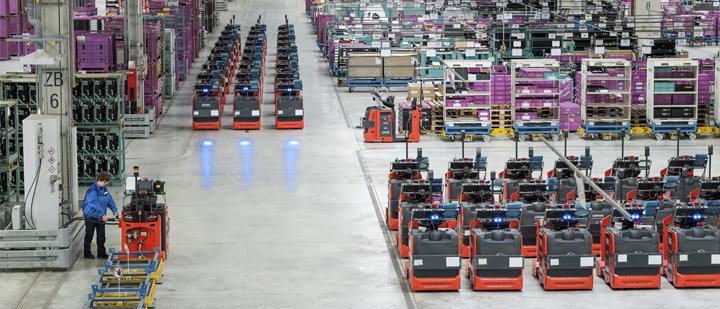Battery-powered industrial trucks have many disadvantages, such as long battery charging and cooling times, the need for separate charging rooms for battery charging, harmful vapours, relatively short service life, effort to change the battery and thus avoidable process times. In comparison, fuel cell-powered industrial trucks offer many advantages, but are not yet feasible - there is a lack of operator and service concepts, neutral scientific analyses and knowledge regarding operational lifetime and other technical questions as well as standards for operation. Many challenges still have to be met for a safe, economical and thus competitive use of the hydrogen-powered trucks.
The motivation for the FFZ70 project is to overcome precisely these obstacles regarding an economical operation of a H2-fleet in production and to achieve the development, testing, deployment and economical operation of this fleet, including the construction of the necessary hydrogen infrastructure.
The subgoals of the project are based on the results and experiences of the research project H2IntraDrive as well as the challenges in the ongoing operation of the hydrogen-powered fleet in the BMW plant in Leipzig.
The partners work on the six identified challenges in different work packages:
- Operator concept: In large production facilities, logistics partners often obtain the order to operate the industrial truck fleet. The partners deal with emerging problems, e.g. keep spare parts in stock and provide an emergency concept. When the process owner decides to change the energy storage of a truck, it is important to provide an operator concept. Experiences show the necessity of such a concept to lower the existing barriers for a successful introduction of hydrogen-driven technologies. There are currently no comprehensive operator concepts for H2-driven industrial trucks and fleets.
- Standardization of interfaces: A definition, implementation and standardization of the interfaces between all the involved technical components and the associated service providers will enable a more efficient operation of a H2-FC-fleet. Existing interfaces between fuel cell, vehicle, hydrogen infrastructure and he control technology lack standardization and have huge potential for optimization.
- Plug & Play solution to retrofit fleets: existing technological barriers to implement fuel cells to existing battery-powered fleets and high cost for this integration show the need of a Plug & Play solution. The project partners thus work on recommendations for a "H2ready" concept that gives other manufacturers the opportunity to implement the interface efficiently in their products.
- Proof of economic efficiency in fleet operation: Currently, there is no concept that realizes an economical and thus competitive use of H2-powered industrial trucks and their fleets in intralogistics. Only a solid concept for the economical operation of such a fleet will help the technology’s success.
- Service and training concept: The external assignment of a fleet to an operator with a corresponding operator concept requires a service provider who offers a comprehensive service as well as training concept. A comprehensive service concept is thus also necessary for a successful exploitation of the project results and for a significant contribution to the NIP's goal of accelerating the market ramp-up of the H2-technology.
In order to achieve the six defined goals, the project partners have developed a procedure with a division into seven work packages. The partners mainly work on the work packages jointly, whereby one partner is always responsible for one work package. The areas of responsibility of the chair lie in the definition of requirements for data collection as well as in the scientific monitoring of all other work packages.
